This report investigates the relationship between completing probation and enforcing payment of fines and fees. Relying on interviews and information received from probation departments, attorneys, and people on probation, this report illustrates that the consequences for nonpayment of court debt and supervision costs can trigger even deeper involvement in the criminal justice system. When a person fails to comply with their probation by not paying court debt or fees for court-ordered programs, they may be incarcerated, their terms of probation may be extended for months or years, and they can be subjected to additional sanctions which likely increase their court debt. Judges rarely conduct adequate ability-to-pay assessments and probation departments exercise unchecked authority, leaving probationers vulnerable to suffer undue financial hardship and punishment. The authors conclude this report with recommendations to better protect people on probation, especially those who cannot afford the onerous costs of the system.
You can read the full text of the report here.
Key findings
- Probation departments often set the terms of a person’s payment plan without the guidance of formal policies. Researchers did not receive a single internal policy outlining how a probation officer should assess a person’s ability to pay from any of the departments they contacted.
- 48 states have laws that allow supervision fees to be charged to people on probation. Monthly supervision fees range from $10 to $150 and fixed fees set by probation terms can cost between $30 and $600.
- Costs of court-ordered drug testing, electronic monitoring, and classes and programs compound probation costs.
- Judges often underestimate the financial burden of probation and other court-ordered requirements. Some are not sympathetic to a person that is unable to pay these costs, which can result in an unwillingness to waive or lower fines and fees.
- Probation officers can impose graduated sanctions– additional conditions in response to a person’s noncompliance with their supervision requirements– when a person fails to pay court debt. These additional requirements are likely to increase a person’s overall financial burden and may result in incarceration d when they actually need their fines and fees lowered or waived.
- Despite the Bearden v. Georgia ruling and the outlawing of debtors’ prisons, courts rarely assess a person’s ability to pay in an appropriate manner and people are jailed for nonpayment of fines and fees.
- A person’s inability to pay fines and fees can lengthen their term of probation for months or years, subjecting them to all of the restrictions of their supervision for a term longer than their original sentence.
Recommendations
- Payment of fines and fees should not be a condition of probation.
- Jurisdictions should eliminate all supervision fees and stop imposing probation conditions that cost money.
- Violations for nonpayment should not be linked to graduated sanctions and people should be able to address their inability to pay with the court.
- Probation officers should not arrest or incarcerate people for nonpayment or violations due to nonpayment.
- Probation departments should not petition the court to revoke a person’s probation due to their inability to pay court fines and fees or supervision costs.
- Probation departments should not extend probation, seek civil judgments for court debt, or prevent people from getting benefits or voting because of a person’s inability to pay court debt.
